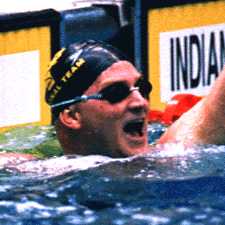 |
||
|
|
RECORD MONSTER ON THE POOL! By the time Mark Spitz had left Munich, Germany in 1972 he could say it seven more times. Not only had "Mark the Shark" won seven gold medals; he had established seven world records in every one of his seven events. Never before had any Olympian, in any sport, accomplished such an incredible feat. It was one of the most dominating athletic performances of all time.
Mark Spitz was born and raised to swim. He spent his childhood, from age two, in the water. With his father's "swimming isn't everything, winning is" attitude Mark was trained to win and win only. After four years in Hawaii, where Mark's father taught him to swim, the Spitz family moved back to California when Mark was six. He spent his days at the YMCA where he would receive his first competitive instruction. At age nine, he was swimming under celebrated coach Sherm Chavoor at Arden Hills Swim Club. When Spitz was 10, his afternoon swimming workouts would
come into direct conflict with his Hebrew School lessons. His father, Arnold Spitz, told
the rabbi, "Even God likes a winner." No one could dispute the fact that Mark
Spitz was indeed a winner, not even God. It would be swimming's most difficult stroke in which Spitz
excelled. The butterfly was the most strenuous for other swimmers but Spitz just seemed to
glide through the water with ease. In 1967, when Mark was 17, he would win five gold
medals at the Pan-American Games in Winnipeg. Mark Spitz had set 10 world records at the
young age of 17. By the time Spitz was 18, he had won 26 national and international titles
and broken 26 U.S. records to go along with his 10 world. Then came the Olympics of 1968. He jumped back in the pool at Indiana University where he trained with coach Doc Counsilman. He thrived under his coach and put together a stellar college career at IU where he continued to accumulate his winnings. Spitz led coach Counsilman's team to four NCAA Championships. He won eight individual NCAA titles. In his junior year he won the Sullivan Award, which is given to the country's top amateur athlete. He was named the World Swimmer of the Year his freshman, junior, and senior years. Then came the Olympics of 1972. Redemption. The public pressed Spitz for weeks, "How many gold
medals are you going to win?" they hounded the 22-year-old swimmer. Never had Mark
Spitz possessed more incentive to win than now. He wasn't saying it out loud; he had
learned his lesson, but inside he was again thinking big, six gold medals kind of big. All in all, Mark Spitz will be remembered as one of the
greatest Olympians of all time. With eleven medals (nine gold, more than any other Olympic
athlete in history) Mark Spitz and fellow swimmer Matt Biondi are the all-time leading
U.S. Olympic medal winners. In his career, Spitz set 26 individual world records in the
freestyle and butterfly, also contributing to seven relay world records.
|
|
| Prepared by OLIMPIST | ||

